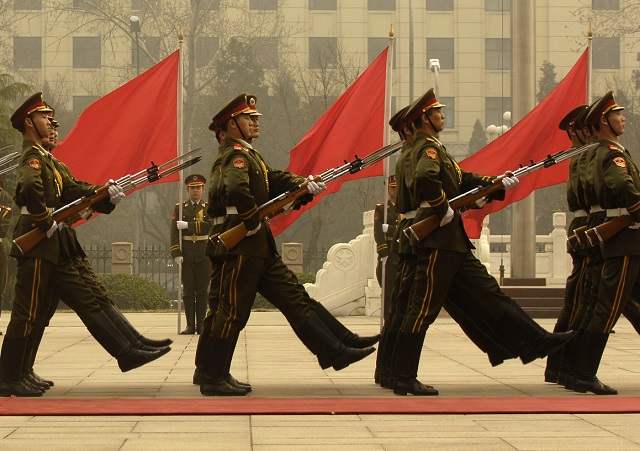China’s imperial overreach
Posted By Brahma Chellaney on May 25, 2017 @ 11:10

Chinese President Xi Jinping’s tenure has been marked by high ambition. His vision—the ‘Chinese dream’ [1]—is to make China the world’s leading power by 2049, the centenary of communist rule. But Xi may be biting off more than he can chew.
A critical element of Xi’s strategy to realize the Chinese dream is the ‘one belt, one road’ (OBOR) initiative, whereby China will invest in infrastructure projects abroad, with the goal of bringing countries from Central Asia to Europe firmly into China’s orbit. When Xi calls [2] it ‘the project of the century,’ he may not be exaggerating.
In terms of scale or scope, OBOR has no parallel in modern history. It is more than 12 times [3] the size of the Marshall Plan [4], America’s post-World War II initiative to aid the reconstruction of Western Europe’s devastated economies. Even if China cannot implement its entire plan, OBOR will have a significant and lasting impact.
Of course, OBOR is not the only challenge Xi has mounted against an aging Western-dominated international order. He has also spearheaded the creation of the Asian Infrastructure Investment Bank [5], and turned to China’s advantage the two institutions associated with the BRICS grouping of emerging economies (the Shanghai-based New Development Bank [6] and the $100 billion Contingent Reserve Arrangement [7]). At the same time, he has asserted Chinese territorial claims in the South China Sea more aggressively, while seeking to project Chinese power in the western Pacific.
But OBOR takes China’s ambitions a large step further. With it, Xi is attempting to remake globalization on China’s terms, by creating new markets for Chinese firms, which face a growth slowdown and overcapacity at home.
With the recently concluded OBOR summit [8] in Beijing having drawn 29 of the more than 100 invited heads of state or government, Xi is now in a strong position to pursue his vision. But before he does, he will seek to emerge from the National Congress of the Chinese Communist Party later this year as the country’s most powerful leader since Mao Zedong.
Since taking power in 2012, Xi has increasingly centralized power, while tightening [9] censorship and using anti-corruption probes to take down political enemies. Last October, the CCP bestowed on him the title of ‘core’ leader.
Yet Xi has set his sights much higher: he aspires to become modern China’s most transformative leader. Just as Mao helped to create a reunified and independent China, and Deng Xiaoping launched China’s ‘reform and opening up,’ Xi wants to make China the central player in the global economy and the international order.
So, repeating a mantra of connectivity, China dangles low-interest loans in front of countries in urgent need of infrastructure, thereby pulling those countries into its economic and security sphere. China stunned the world by buying [10] the Greek port of Piraeus for $420 million. From there to the Seychelles, Djibouti, and Pakistan, port projects that China insisted were purely commercial have acquired military dimensions.
But Xi’s ambition may be blinding him to the dangers of his approach. Given China’s insistence on government-to-government deals on projects and loans, the risks to lenders and borrowers have continued to grow. Concessionary financing may help China’s state-owned companies bag huge overseas contracts; but, by spawning new asset-quality risks, it also exacerbates the challenges faced by the Chinese banking system.
The risk of non-performing loans at state-owned banks is already clouding China’s future economic prospects. Since reaching a peak of $4 trillion in 2014, the country’s foreign-exchange reserves have fallen by about a quarter [11]. The ratings agency Fitch has warned [12] that many OBOR projects—most of which are being pursued in vulnerable countries with speculative-grade credit ratings—face high execution risks, and could prove unprofitable.
Xi’s approach is not helping China’s international reputation, either. OBOR projects lack transparency and entail no commitment to social or environmental sustainability. They are increasingly viewed as advancing China’s interests—including access to key commodities or strategic maritime and overland passages—at the expense of others.
In a sense, OBOR seems to represent the dawn of a new colonial era—the twenty-first-century equivalent of the East India Company [13], which paved the way for British imperialism in the East. But, if China is building an empire, it seems already to have succumbed to what the historian Paul Kennedy famously called [14] ‘imperial overstretch.’
And, indeed, countries are already pushing back. Sri Lanka, despite having slipped into debt servitude to China, recently turned away [15] a Chinese submarine attempting to dock at the Chinese-owned Colombo container terminal. And popular opposition to a 15,000-acre industrial zone in the country has held up China’s move to purchase an 80% stake in the loss-making Hambantota port that it built nearby.
Shi Yinhong, an academic who serves as a counselor to China’s government, the State Council, has warned [16] of the growing risk of Chinese strategic overreach. And he is already being proved right. Xi has gotten so caught up in his aggressive foreign policy that he has undermined his own diplomatic aspirations, failing to recognize that brute force is no substitute for leadership. In the process, he has stretched China’s resources at a time when the economy is already struggling and a shrinking working-age population presages long-term stagnation.
According to a Chinese proverb, ‘To feed the ambition in your heart is like carrying a tiger under your arm.’ The further Xi carries OBOR, the more likely it is to bite him.
Article printed from The Strategist: https://www.aspistrategist.org.au
URL to article: https://www.aspistrategist.org.au/chinas-imperial-overreach/
URLs in this post:
[1] Chinese dream’: https://www.theatlantic.com/international/archive/2015/06/china-dream-liu-mingfu-power/394748/
[2] calls: https://www.ft.com/content/88d584a2-385e-11e7-821a-6027b8a20f23
[3] 12 times: http://fortune.com/china-belt-road-investment/
[4] Marshall Plan: http://marshallfoundation.org/marshall/the-marshall-plan/history-marshall-plan/
[5] Asian Infrastructure Investment Bank: https://www.aiib.org/en/index.html
[6] New Development Bank: http://www.ndb.int/
[7] Contingent Reserve Arrangement: http://brics.itamaraty.gov.br/media2/press-releases/220-treaty-for-the-establishment-of-a-brics-contingent-reserve-arrangement-fortaleza-july-15
[8] OBOR summit: http://english.mofcom.gov.cn/article/zt_ydyl_english/lanmu2/201705/20170502575013.shtml
[9] tightening: https://www.washingtonpost.com/world/asia_pacific/chinas-scary-lesson-to-the-world-censoring-the-internet-works/2016/05/23/413afe78-fff3-11e5-8bb1-f124a43f84dc_story.html?utm_term=.cb16da0fc65d
[10] buying: http://uk.reuters.com/article/uk-eurozone-greece-privatisation-china-c-idUKKCN0X50XD
[11] quarter: https://www.bloomberg.com/news/articles/2017-05-07/china-reserves-rise-a-third-month-amid-tighter-capital-controls
[12] warned: http://www.reuters.com/article/idUSFit987609
[13] East India Company: https://books.google.co.in/books?id=osYVAQAAMAAJ&q=East+India+Company&dq=East+India+Company&hl=en&sa=X&redir_esc=y
[14] called: http://www.penguinrandomhouse.com/books/91615/the-rise-and-fall-of-the-great-powers-by-paul-kennedy/9780307773562/
[15] turned away: http://www.scmp.com/news/asia/diplomacy/article/2094093/sri-lanka-refuses-port-call-chinese-submarine-after-indian
[16] warned: http://pit.ifeng.com/a/20161004/50060678_0.shtml
Click here to print.